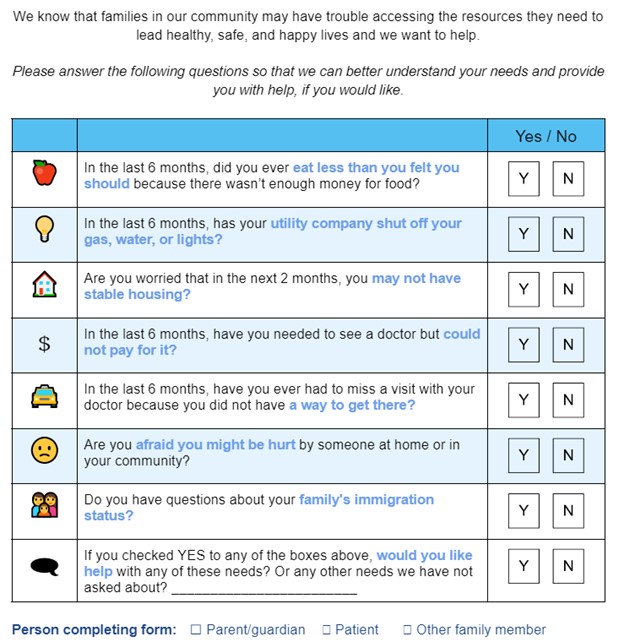Session Information
Session Type: Poster Session B
Session Time: 9:00AM-11:00AM
Background/Purpose: Social drivers of health (SDoH) such as access to housing and food, may significantly influence safe and timely transition to adult healthcare, yet routine screening for psychosocial barriers is uncommon in the pediatric setting. This study aims to successfully implement SDoH screening and proactive social work support into an existing standardized transition program and to assess correlations between positive SDoH screening and transition readiness among pediatric rheumatology patients.
Methods: As part of the clinic’s transition program, established patients aged 14 and older with chronic rheumatic disease complete the transition readiness assessment questionnaire (TRAQ) and meet with a child life specialist every 6 months to learn healthcare self-management skills. A physician associate helps the patient schedule their first adult rheumatology visit. Starting August 2022, the SDoH screener, adapted from the Health Leads Screening Toolkit, was given to this same group of eligible patients, or legal guardians if under age 18 (Figure 1). The primary process measure was the percentage of eligible patients who completed the SDoH screener each month and the primary outcome measure was the percentage of positive SDoH screens. A secure daily message was sent to providers, social work and medical assistants to confirm patient and family suitability to receive screeners. Results of SDoH screening were shared in the same morning text thread at time of rooming and families with positive screens were offered a meeting with the social worker. Two-sample t-test was used to determine the correlation between TRAQ scores and SDoH positivity.
Results: A total of 94 patients/families (median patient age 17 years, IQR 16-18.0) completed the SDoH screener from August 2022 through March 2023 with an average of 59.9% eligible patients per month (Figure 2). Of the completed SDoH screeners, 14.9% (n=14) were positive and 64.2% (n=9) of those families met with social work. Most common social needs included transportation issues (n = 6), food insecurity (n = 6) and financial barriers (n = 6) (Figure 3). Average TRAQ score was 3.43/5 (SD = 0.76) for all patients. There was not a significant difference in mean TRAQ score for patients with positive SDoH screen (mean 3.23 +/- 0.66) and negative SDOH screen (mean 3.52 +/- 0.77; p = 0.2). There was not an association between primary rheumatologic diagnosis and SDoH screen positivity. Since implementation of SDoH screening, only 11 patients have completed their final pediatric rheumatology visit, limiting further analysis of correlation between transition success and SDoH screening.
Conclusion: Implementation of an SDoH screener facilitated proactive social work support for a vulnerable population at risk for an unstable transition to adult care. Transportation, food insecurity, and financial barriers were the most commonly identified needs, informing clinic resource preparation. Next steps include continued long-term follow up of patient cohort, addressing barriers to social work interface with families and collecting patient-facing data regarding SDoH screening acceptability and process to explore possible underreporting bias in our patient population.
To cite this abstract in AMA style:
Ciprien M, Barrientos S, Christenholz C, Benett E, Peterson R. Incorporation of Social Drivers of Health Screening into a Structured Healthcare Transition Program for Adolescents and Young Adults with Chronic Rheumatic Disease [abstract]. Arthritis Rheumatol. 2023; 75 (suppl 9). https://acrabstracts.org/abstract/incorporation-of-social-drivers-of-health-screening-into-a-structured-healthcare-transition-program-for-adolescents-and-young-adults-with-chronic-rheumatic-disease/. Accessed .« Back to ACR Convergence 2023
ACR Meeting Abstracts - https://acrabstracts.org/abstract/incorporation-of-social-drivers-of-health-screening-into-a-structured-healthcare-transition-program-for-adolescents-and-young-adults-with-chronic-rheumatic-disease/



